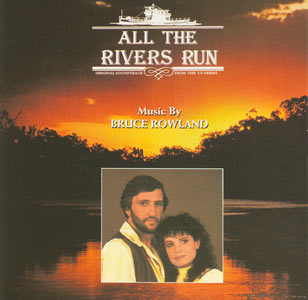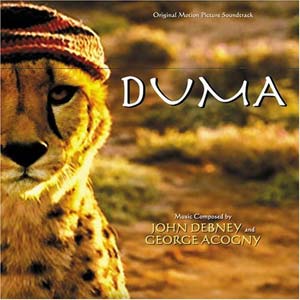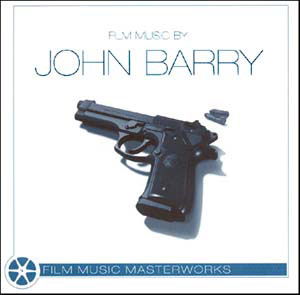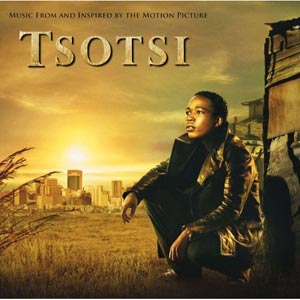Editorial: Also Received
All the Rivers Run (Bruce Rowland - BSX Records BSXCD 886; 42:29)
This is a pleasant, easy-going, ambling score for an Australian TV series. Its opening track is full of folksy charm, its rhythms cantering, and timp ostinati reach back to those Big Country timp rolls of Jerome Morross. ‘The Love Theme of Deli and Brenton’ continues this mood of cosy nostalgia while the opening of the River Theme is in its orchestration and mood is typically Australian outback before saccharine nostalgia takes over. ‘Adagio in A minor’ is more introspective, dreaming over what might have been? The rest of the album follows in much the same pattern with some washboard whimsy for ‘Meet Cyrus’ and ‘Paddy Goes Overboard’, some romantic waltzes, some nice humorous jazzy material in ‘Creeping around’ and ‘The Automobile’ Harmonica and guitars are strongly featured in a few tracks. Some pounding-hoof-turbulence enters with ‘The Horse Goes Bananas’. But generally the ear quickly tires of the constant repeats of the main theme, its variations rather thin. Nothing very original. An album that will appeal mostly to avid fans of the TV series.
Ian Lace
Rating:4
Duma (John Debney/ George Acogny – Varese Sarabande VSD 6701; 40:56)
For Duma, an inspiring tale of friendship between a boy and a cheetah, acclaimed composer John Debney (The Passion of the Christ) teamed up with the relatively unknown composer/arranger George Acogny. The result is a tender, lullaby-like score with lots of fun ostinatos and a good use of ethnic African percussion instruments. The ensemble is divided into three sections, with rhythm/percussion as its ground element, a chamber-sized string orchestra, and a small group of vocalists. It is a highly simplistic effort that has some fine moments, especially through ‘Cute Kitten Montage’ and the wonderful climax that is ‘Leaving Rip’.
Mark Rayen Candasamy
Rating:3.5
Film Music by John Barry (John Barry - Silva Screen SILCD2002; 53.19)
This is one of two premiere titles in Silva Screen’s new Film Music Masterworks series. Which is to say single discs as functional as their titles, presented in minimal white packaging presumably designed to stand out in the supermarket. The same tracks have been endlessly recycled by Silva Screen before, most if not all having appeared on previous Silva anthologies. There’s nothing wrong with the recordings, but these discs are not aimed at film music buffs, rather at casual shoppers who don’t already have these tracks and might buy them on a whim if they are conveniently placed and cheap enough. A more or less random selection of famous John Barry themes, across 14 tracks the music spans Zulu (1964) to Dances With Wolves (1990). Its perfectly serviceable, but nothing to get excited about.
Gary Dalkin
Rating:2.5
Film Music by Ennio Morricone (Ennio Morricone - Silva Screen SILCD2003; 53.19)
The second of two premiere titles in Silva Screen’s Film Music Masterworks series is the more redundant of the two. If it seemed there’s already a lot of John Barry compilations out there for this album’s sister release to compete with, then this CD has even more of an uphill climb, for if there’s one type of album the market is glutted with, it’s Morricone compilations! The track listing draws from the most recognizable work Morricone has done, starting with the Leone films (seven of the fourteen tracks), with the most recent titles being The Mission (1986) and The Untouchables (1987). All are culled from the two-disc Once Upon a Time…: The Essential Ennio Morricone Film Music Collection (SILCD 1165 – reviewed here by Gary Dalkin), a collection of average performances by the City of Prague Philharmonic that at least had the benefit of some interesting inclusions.
With so much emphasis on the spaghetti western material here, the discrepancy of execution to the original is more in evidence than ever – ‘Man with a Harmonica’ is appalling, a ominous album opener. The more romantic ‘Deborah’s Theme’ and ‘Jill’s Theme’ are better executed. But Morricone’s music has been compiled many times, both the original performances with all their zany genius, and re-recordings supervised by the Maestro, and it hardly seems like there’s a place for this album save in the supermarket. Yo Yo Ma’s collaborative album with Morricone on Sony Classical (reviewed here) or Silva’s own release mentioned above would seem to be a much better place to start, even if the prices are a bit higher. Not for the serious collector.
Michael McLennan
Rating:2
Music Inspired by Da Vinci (Jan Kisjes – Sony BMG 82876822362; 45.48)
This is this issue’s bandwagon jumper. Decca might have Hans Zimmer’s soundtrack to the film of The Da Vinci Code, but Sony are feeling ‘inspired’. This isn’t film music, and the album arrived unsolicited. The music is by Jan Kisjes and it sounds like a blend of a contemporary pop stage musical, Enigma’s electronically processed chanting monks and Clannad’s electro-Celtic ambience. It’s a world removed from the Gothic tension one might expect. More insipid than inspired.
Gary Dalkin
Rating:1
Tsotsi(Zola, Mark Kilian/Paul Hepker, various – Milan M2-36166; 68.24)
This is the original soundtrack album to the recent Oscar winner for Best Foreign Language film about poverty and crime in contemporary South Africa. The album blends contemporary African music with a short score by Mark Kilian and Paul Hepker. The songs are mostly by Zola, and are done in style of rap called Kwaito – beat-driven, energetic, with occasionally explicit language. Songs by Unathi, Pitch Black and others aren’t always in this style, but certainly don’t clash with it. The score selections are spread over five short tracks (six if you count the instrumental by Vusi Mahlasela), and feature female vocalist (Vusi Mahlasela), viola, percussion, and small choir. The material is simple and emotional, though certainly restrained. Unless you’re particularly attracted to kwaito, this disc is not recommended – rather Alberto Iglesias’s The Constant Gardener is worth checking out.
Michael McLennan
Rating:2
Return to Reviews Index



